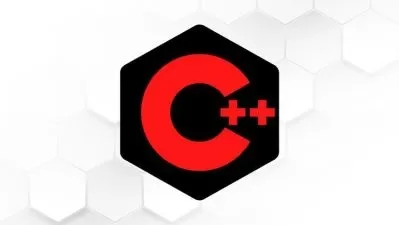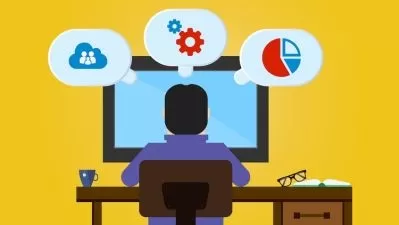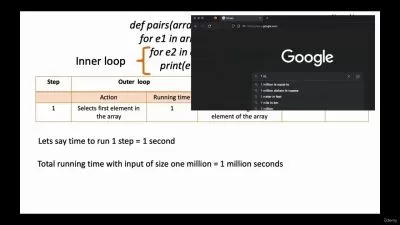Data Structures and OOP with C++ | CS104, CS105 Masterclass
OCSALY Academy | 160.000+ Students
8:27:40
Description
Master the art of OOP and data structures using C++. Enroll in CS104, C105 Masterclass now and boost your coding skills!
What You'll Learn?
- Discover the principles of Data Structures and Object-Oriented Programming in C++.
- Gain a comprehensive understanding of the language's syntax and semantics.
- Learn the fundamentals of algorithms and how they are applied in C++.
- Understand the principles of data abstraction, inheritance, and polymorphism
- Build strong foundation for developing efficient and reliable software applications.
- Explore the differences between various data structures, such as arrays, linked lists, stacks, and queues.
- Develop a sound understanding of memory management in C++.
- Build algorithms that allow for efficient processing of data.
- Understand the concept of recursion and how to implement it in C++.
- Learn how to write and implement classes in C++.
- Master the principles of encapsulation and data hiding.
- Understand the power of inheritance and its application in OOP.
- Create and implement abstract data types.
- Develop programs that use advanced data structures such as trees and graphs.
- Gain a deep understanding of pointers and dynamic memory allocation in C++.
- Learn how to use templates to build generic classes and functions.
- Understand the principles of operator overloading in C++.
- Master the principles of exception handling in C++.
- Explore the principles of file input and output in C++.
- Build programs that use advanced algorithms such as sorting and searching.
- Create programs that use data structures and algorithms to solve real-world problems.
- Learn how to test and debug C++ programs effectively.
- Understand the principles of software engineering and how they apply to C++.
- Develop programs that interact with users through a graphical user interface.
- Understand the principles of multi-threaded programming in C++.
- Gain an appreciation for the role of C++ in modern software development.
- Learn how to build software that is efficient, scalable, and maintainable.
- Understand the principles of software design and how to apply them in C++.
- Develop the skills to work with large and complex codebases.
- Learn how to build software that is both functional and elegant.
Who is this for?
More details
DescriptionWelcome to our CS104, C105 Masterclass! In this class, we will dive into the world of Data Structures and Object-Oriented Programming (OOP) using the popular programming language, C++.
Data structures are an essential part of computer science, as they provide an organized way of storing and manipulating data. By using data structures, we can access and modify data more efficiently, which is essential for developing efficient and effective software.
In our class, we will cover various data structures, including arrays, linked lists, stacks, queues, and trees. We will explore how to implement these structures in C++ and how to perform basic operations like insertion, deletion, and searching. Additionally, we will discuss the advantages and disadvantages of each data structure and when to use them in different situations.
Linked lists, for example, are a popular data structure used to store and manage data in a sequence. Linked lists are efficient because they can be dynamically allocated and are flexible in size. However, they can be more complicated to implement and use than other data structures like arrays.
Stacks and queues are also important data structures that are commonly used in software development. Stacks use the "last in, first out" (LIFO) principle, while queues use the "first in, first out" (FIFO) principle. These data structures are useful for managing data in a specific order, and we will learn how to implement and use them in our class.
Trees are another popular data structure that we will cover in our class. Trees are useful for organizing data in a hierarchical structure and are often used in computer science applications like file systems, databases, and search engines.
In addition to data structures, we will also cover the basics of OOP in C++. Object-oriented programming focuses on encapsulation, inheritance, and polymorphism. With OOP, we can create reusable code, improve code organization and structure, and make code maintenance more manageable.
In our class, we will cover the basics of OOP in C++, including classes, objects, constructors, and destructors. We will also discuss inheritance, polymorphism, and encapsulation, and how they can be used to improve the functionality of our programs.
C++ is a powerful programming language known for its speed and efficiency. It is widely used in developing operating systems, embedded systems, and gaming applications. With C++, we can take advantage of its powerful features to create complex programs with high performance.
In our class, we will explore the C++ syntax and how it can be used to implement data structures and OOP concepts. We will also learn how to optimize our code for performance and efficiency.
To wrap it up, our CS104, C105 Masterclass will provide you with a solid foundation in Data Structures and Object-Oriented Programming with C++. You will learn how to implement data structures, use OOP concepts to improve your code, and take advantage of the powerful features of C++.
Who this course is for:
- This course is ideal for individuals who want to enhance their programming skills with C++ and learn the fundamentals of data structures and OOP.
- Aspiring computer science students who want to get a head start in their coursework or professionals who wish to expand their knowledge of programming will benefit from this course.
- Students who have a basic understanding of C++ but want to learn advanced techniques and concepts such as inheritance, polymorphism, and abstraction should take this course.
- Students who have a basic understanding of C++ but want to learn advanced techniques and concepts such as inheritance, polymorphism, and abstraction should take this course.
- Programmers who want to learn how to design efficient algorithms and optimize code will find this course valuable.
- This course is also suitable for individuals who are interested in pursuing a career in software development, particularly in industries such as gaming, mobile app development, and finance.
Welcome to our CS104, C105 Masterclass! In this class, we will dive into the world of Data Structures and Object-Oriented Programming (OOP) using the popular programming language, C++.
Data structures are an essential part of computer science, as they provide an organized way of storing and manipulating data. By using data structures, we can access and modify data more efficiently, which is essential for developing efficient and effective software.
In our class, we will cover various data structures, including arrays, linked lists, stacks, queues, and trees. We will explore how to implement these structures in C++ and how to perform basic operations like insertion, deletion, and searching. Additionally, we will discuss the advantages and disadvantages of each data structure and when to use them in different situations.
Linked lists, for example, are a popular data structure used to store and manage data in a sequence. Linked lists are efficient because they can be dynamically allocated and are flexible in size. However, they can be more complicated to implement and use than other data structures like arrays.
Stacks and queues are also important data structures that are commonly used in software development. Stacks use the "last in, first out" (LIFO) principle, while queues use the "first in, first out" (FIFO) principle. These data structures are useful for managing data in a specific order, and we will learn how to implement and use them in our class.
Trees are another popular data structure that we will cover in our class. Trees are useful for organizing data in a hierarchical structure and are often used in computer science applications like file systems, databases, and search engines.
In addition to data structures, we will also cover the basics of OOP in C++. Object-oriented programming focuses on encapsulation, inheritance, and polymorphism. With OOP, we can create reusable code, improve code organization and structure, and make code maintenance more manageable.
In our class, we will cover the basics of OOP in C++, including classes, objects, constructors, and destructors. We will also discuss inheritance, polymorphism, and encapsulation, and how they can be used to improve the functionality of our programs.
C++ is a powerful programming language known for its speed and efficiency. It is widely used in developing operating systems, embedded systems, and gaming applications. With C++, we can take advantage of its powerful features to create complex programs with high performance.
In our class, we will explore the C++ syntax and how it can be used to implement data structures and OOP concepts. We will also learn how to optimize our code for performance and efficiency.
To wrap it up, our CS104, C105 Masterclass will provide you with a solid foundation in Data Structures and Object-Oriented Programming with C++. You will learn how to implement data structures, use OOP concepts to improve your code, and take advantage of the powerful features of C++.
Who this course is for:
- This course is ideal for individuals who want to enhance their programming skills with C++ and learn the fundamentals of data structures and OOP.
- Aspiring computer science students who want to get a head start in their coursework or professionals who wish to expand their knowledge of programming will benefit from this course.
- Students who have a basic understanding of C++ but want to learn advanced techniques and concepts such as inheritance, polymorphism, and abstraction should take this course.
- Students who have a basic understanding of C++ but want to learn advanced techniques and concepts such as inheritance, polymorphism, and abstraction should take this course.
- Programmers who want to learn how to design efficient algorithms and optimize code will find this course valuable.
- This course is also suitable for individuals who are interested in pursuing a career in software development, particularly in industries such as gaming, mobile app development, and finance.
User Reviews
Rating
OCSALY Academy | 160.000+ Students
Instructor's Courses
Udemy
View courses Udemy- language english
- Training sessions 65
- duration 8:27:40
- Release Date 2023/03/29















